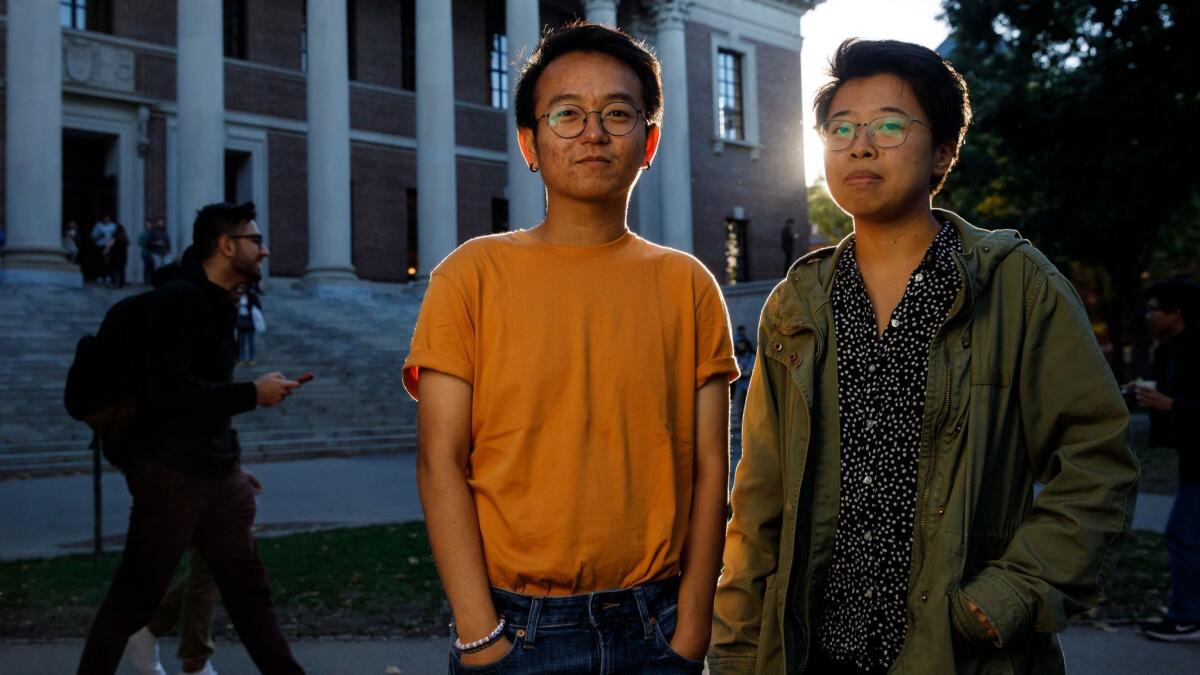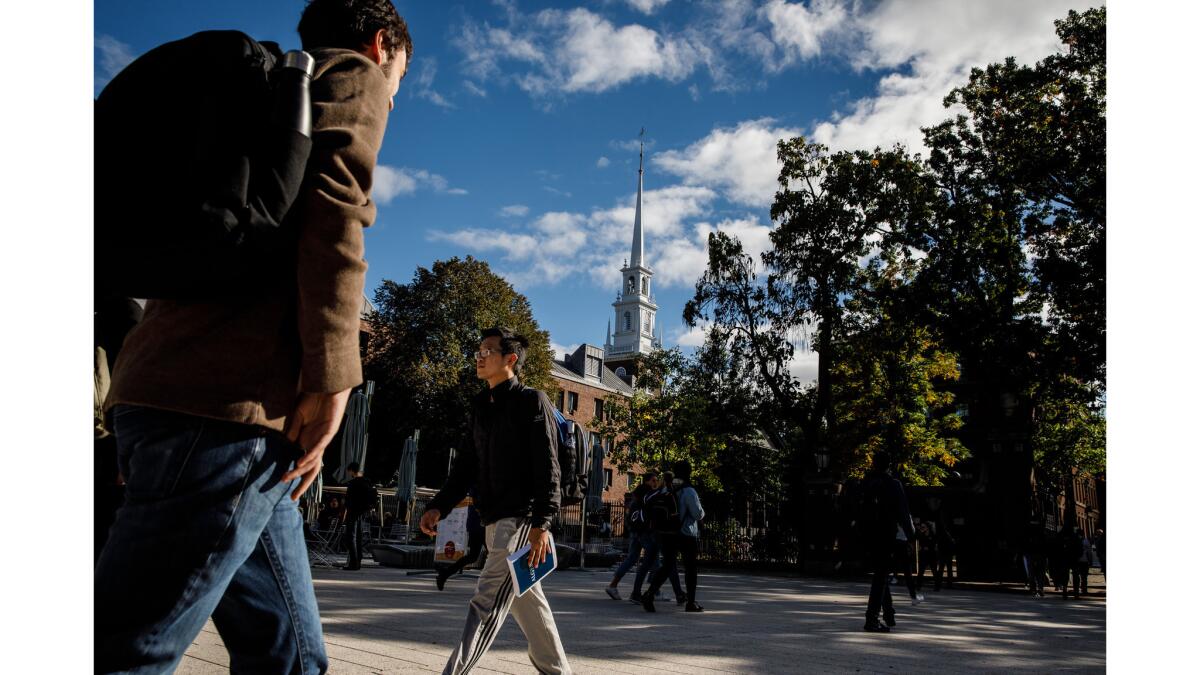Does Harvard discriminate against Asians? In a case that could upend college admissions, the Ivy League goes on trial

- Share via
Both Harrison Chen and Thang Diep graduated No. 1 from public high schools. Both excelled in extracurricular activities and scored high on their college admissions tests. And both are Asian American.
But the similarities stop there.
Chen, who was raised by middle-class Chinese immigrants outside Raleigh, N.C., was rejected by Harvard University. Diep, a Vietnamese immigrant who grew up in a working-class family in Reseda, got in.
Their experiences have left them with distinct feelings about affirmative action and a federal lawsuit against Harvard that puts Asian Americans at the center of one of the most contentious issues in higher education.
Chen opposes the consideration of race in college admissions and plans to join like-minded Asian Americans at a rally in Boston on Sunday, a day before Harvard is scheduled to go on trial.
“People should be judged on character and merit,” said Chen, an 18-year-old freshman at his backup choice, Vanderbilt University in Nashville. “What does the color of your skin have to do with admissions?”
Diep, who favors affirmative action, plans to attend a rally a few miles away in Harvard Square in support of the university and its policies.
“Removing race won’t advance us to be a more just and equal society,” said Diep, a 21-year-old senior at Harvard. “Rather, it would limit educational opportunities to people from higher classes and a white background.”
The primary fight against affirmative action has long been waged by whites who argue that giving special consideration to racial minorities has unfairly denied them spots at U.S. colleges and universities.
But in the Harvard case, Asian Americans argue that racial considerations have made them a victim of their own academic success. They tend to get better grades and score higher on standardized tests than other races but claim they are frequently rejected as a result of “racial balancing,” which is akin to racial quotas and has been ruled unconstitutional.
They compare themselves to Jewish students who faced admissions quotas at elite schools in the early 20th century.
“Being Asian American actually decreases the chances of admissions,” the lawsuit said. Citing a Duke University economist’s analysis of six years of Harvard admissions data, it claimed that Asian American applicants who have a 25% chance of getting in would have a 35% chance if they were white, and dramatically better odds than that if they were black or Latino.
It also cited an internal 2013 Harvard report that suggested that admissions of Asian Americans would shoot up substantially if they were evaluated based on academics alone.

As it stands, Asian Americans make up 6% of the U.S. population and 22% of Harvard’s current freshman class. The latter number has been rising since 2010.
In responding to the suit, Harvard said studies of its admissions, including its own internal review, have been either inconclusive or flawed. The data used don’t include “essential” application factors such as personal essays and recommendations and excludes recruited athletes and legacy student admissions, the university said in court filings.
A UC Berkeley economist who analyzed Harvard’s admissions data found “no negative effect of Asian American ethnicity,” the filings said.
For each applicant, the university conducts a “whole person review” that includes considerations of racial and nonracial factors such as socioeconomic background in addition to grades, test scores, recommendations, extracurricular activities and “personal qualities” such as being kind, respected and likable — an approach Harvard said is well within the law.
The university and its supporters say that admissions of African Americans and Latinos could decline.
“If the lawsuit against Harvard succeeds, it would diminish students’ opportunities to live and learn in a diverse campus environment — denying them the kind of experiences that are central to Harvard’s educational mission and critical for success in our diverse society,” Harvard said in a statement.
On campus this week, student groups held panels and speeches in support of the university. Online, they used the hashtag #DefendDiversity.
The fight is part of a much larger battle.
The plaintiff is a group called Students for Fair Admissions, which was founded by Edward Blum, a longtime foe of affirmative action. He is white.
In 1992, he ran for Congress as a Republican in Houston and lost, claiming that his district was gerrymandered to guarantee the seat to minorities. He sued Texas and won at the Supreme Court.
Blum was also a significant player in the 2013 Supreme Court case that struck down key portions of the Voting Rights Act of 1965, a decision that civil rights groups say increased voting restrictions, such as voter identification laws that disproportionately affect racial minorities, in several states.
And he helped a white woman sue the University of Texas at Austin over its admissions policy in the most recent affirmative action case to reach the Supreme Court, which in 2016 ruled in favor of the school.
Harvard calls Blum an “anti-race conscious admissions activist,” and one Asian American civil rights group supporting the university in the case said the lawsuit is a “thinly veiled attempt to use Asian Americans to destroy racial diversity on every campus across the country.”
The timing could not be better for affirmative action opponents.
The recent replacement of retired Justice Anthony Kennedy — who wrote the 4-3 majority opinion in the University of Texas case — with the more conservative Justice Brett Kavanaugh could give them a better chance of winning at the Supreme Court, should the case get that far.
And the Trump administration has taken an increasingly aggressive stance against affirmative action.
The Department of Justice launched a separate investigation into Harvard last year after Asian American groups filed a complaint saying it discriminates in admissions. In July, the department rescinded Obama-era guidelines encouraging the use of race in admissions decisions and suggested race-neutral policies.
In August, it submitted a legal brief backing the case against Harvard. And last month it announced it was also investigating Yale in response to complaints from Asian American applicants alleging discrimination.
In a statement on the administration’s support of the Harvard suit, Atty. Gen. Jeff Sessions said the department stepped in to “protect the civil rights of the American people.”
A majority of Americans say merit alone should determine who is admitted to colleges, according to Gallup. At the same time, surveys from the Pew Research Center show that a majority support programs to increase diversity at colleges.
“If there’s a program to support minorities in competing and advancing their prospects in higher education, big majorities will be behind it,” said Laura Stoker, a political scientist at UC Berkeley. “But when it comes to fiddling with selection criteria, the public support dwindles. That’s because affirmative action can be so easily portrayed as a form of unwanted discrimination.”
Overall, 65% of Asian Americans support affirmative action, according to surveys by AAPI Data, which conducts policy research on Asian Americans and Pacific Islanders.
But among Chinese Americans, the largest Asian group in the country, support for race-based preferences fell from 78% in 2012 to 41% in 2016. Support among other Asian American groups held steady at 73%.
At least one group of Asian Americans is standing firmly behind Harvard: those who got in. Many of the people set to testify for the university are current students or alumni. Asian American professors are also supporting their employer.
Diep, who is slated to testify, said in court filings his SAT score of 2060 was high, though “on the lower end of the Harvard average.”
His application file included a note from an admissions officer who pointed out that Diep’s essay has emphasized his “immigrant Vietnamese identity,” and an interviewer noted his “above average personal appeal and character.”
“I was accepted to Harvard most likely based on my personal statement, which reflected the diversity that I brought to campus,” Diep wrote in his court declaration.
On the other side are many Asian Americans who were rejected and their parents.
Chen, who aced 17 Advanced Placement classes in high school, said he holds no grudge against Harvard and is more offended by what he perceives as a “patronizing” admissions process.
Without access to his application file, he acknowledged that he cannot be sure that Harvard would have accepted him even if racial considerations were discontinued.
He will not testify at the trial, but Students for Fair Admissions liked an opinion piece he wrote last month for a Vanderbilt publication, and Chen will speak at a rally with members of the group Sunday.
“We have created institutions that fail to reward merit, losing sight of the American Dream and failing our citizens,” Chen wrote. “We are trying to combat past inequalities with, ironically, additional inequality.”
More to Read
Sign up for Essential California
The most important California stories and recommendations in your inbox every morning.
You may occasionally receive promotional content from the Los Angeles Times.











